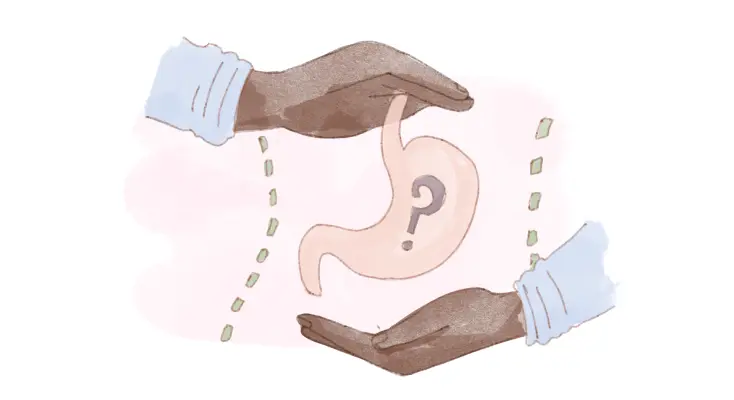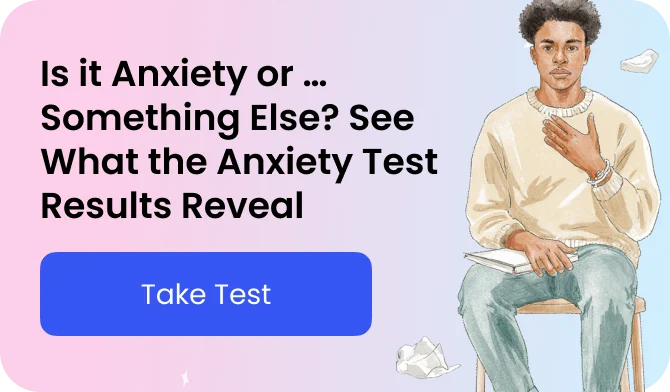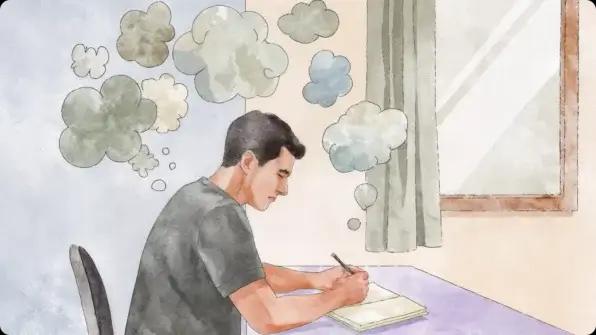Do you want to finish the work tasks, spend time with your family, or enjoy an exciting weekend with friends, but something stops you? Feeling nauseous and sick all the time prevents you from living your best life and turns a random day into a nightmare. And the worst part is that you can’t stop it.
Ring a bell? But did you know that stress and nausea are connected, and negative emotions can make us sick and nauseous? What’s more, the possibility of it is pretty high; nearly 32.3% of US adults reported symptoms of anxiety or depression in 2023. Statistics seem alarming, tbh.
In this article, let’s figure out together how to tell if your nausea is from anxiety, provide some tips on dealing with the issue, highlight cases when you need professional support.
Can Anxiety Cause Nausea?
In a nutshell, yes. Anxiety and nausea are common issues that most of us have experienced at least once.
Do you remember the last time you needed to perform on the stage, do an important presentation, or handle a severe argument with your loved ones? What did you feel?
In such cases, many people experience tummy troubles and related symptoms. You may have problems with your appetite as well.
Why? The reason is simple: everything in our body is connected, and your brain and digestive system aren’t an exception. When you feel anxious, your body provides a fight-or-flight response and triggers some changes.
To deal with the danger, your brain releases hormones like adrenaline and cortisol. They increase heart and breathing rates as well as blood pressure. Then, the body shifts blood from non-essential functions, which may upset your stomach. As a result, anxiety can cause vomiting, nausea, or even, yikes, diarrhea.
Temporary nausea from anxiety is totally OK, and you shouldn’t worry about it.
However, at times, people don’t face real danger; it’s only in our heads. In fact, most adults overthink, which makes us feel stressed almost all the time. Do you want to discover more about how you react to different triggers? Try Breeze tests and learn more about your mental health.
In brief, anxiety and nausea can become your constant companions and lead to even more significant problems with digestion. If you experience weight loss, stomach pain, or continuous nausea for days, you may need to contact a specialist.
How to Tell if Nausea is from Anxiety
Simply put, if nausea hits you only in stress-triggered moments and fades away when you chill, it’s likely anxiety-induced.
Nevertheless, it’s not that simple. There are many symptoms that can help you understand that it’s anxiety causing nausea.
- It often feels like a churning or unsettled feeling in your stomach.
- You may feel butterflies or stomach cramps.
- Also, you can feel stress, vomiting, or throwing up.
- Loss of appetite, increased heart rate, sweating, and dizziness are among other symptoms.
Note that mental health and digestive problems are often connected. Generalized anxiety disorder, phobias, or panic disorder may influence the overall health of your stomach. Imagine that up to one-third of people with irritable bowel syndrome (IBS) also experience anxiety or depression!
Thus, if you have issues with your mental health, nausea from stress may be your reality. Besides, I recommend thinking broader and checking whether any other problems are involved.
So, read further to answer the question: “Does anxiety make you nauseous?”
Why Do I Feel Nauseous? — Physical Reasons
Sometimes, people don’t even notice that they feel anxious. So, when it comes to digestive problems, not all of us can find out the real problem. So, I’m here to help.
“Why am I so nauseous?” Let’s check together now.
- Migraine. Headache and nausea often come together. You may feel dizzy, disoriented, or vomiting, not from anxiety but from severe pain.
- Infections. Food poisoning, as well as viral, bacterial, or parasitic infections, can make you throw up easily. And there’s nothing connected with stress. So, if you feel bad and unsure about the food you eat, it’s better to visit the doctor.
- Gastrointestinal issues. You can feel nauseous because of the upward leaking of stomach contents (gastroesophageal reflux), stomach ulcers, or any other severe problems with the stomach. Be attentive to your health to prevent the development of the disease.
- Pregnancy. Nausea affects most pregnant women, too. So, if there’s a possibility that you’re expecting, it’s better to take a test on the spot, especially as it can affect your emotional state as well.
But can anxiety make you feel sick? Yes, and some things help us understand that this is the reason.
- Specific symptoms. Do you have a racing heartbeat, sharp breath, or trembling hands? If yes, everything mentioned above, as well as nausea, can be caused by anxiety.
- Time. If you feel nervous and vomiting only before big events, and this feeling goes away when everything is OK, probably, you have anxiety-induced nausea.
- Persistence. Do you feel sick for hours, days, or weeks? If nausea is a permanent state, there are two options. First, there are other reasons besides anxiety. Second, you have an anxiety disorder that makes you feel stressed all the time.
Mental Issues that Cause Stress Nausea
Can temporary anxiety cause nausea for days? Actually, no. But many mental health disorders can make your stomach sick permanently, this way influencing the overall quality of life.
Don’t you think that this doesn’t concern you? Actually, about 1 in 4 adults in the US has a diagnosable mental disorder. In other countries, the situation may be even worse. Thus, I recommend that you read this section attentively and contact a specialist if you have similar symptoms.
These are common disorders that can make you feel nausea and stress:
Phobias
Katy Perry is afraid of darkness, Madonna of thunder, and Johnny Depp of clowns. What are you terrified of?
Having phobias is natural, and you shouldn’t be ashamed of them. Moreover, you can live a happy and full life with most of them. At least until it causes nausea or a panic attack.
Sometimes, people are so frightened of their phobias that they become unable to do regular things. Shopping, going to a cafe, or traveling with family can become a problem. And this is where you need to contact a specialist.
What’s more, if you have permanent stomach pain or anxiety, it may be the result of this mental issue. And, of course, it’s better to deal with it.
Panic Disorder
Sadly, having panic attacks is becoming a new norm of our reality. So, if you struggle with this problem, you need to know that a panic attack and nausea are often connected. You can feel nauseous and then have a panic attack or want to throw up right after it.
I recommend contacting the specialist if you suspect that you have a panic disorder. Solving the problem in advance is better than dealing with the consequences later.
Generalized Anxiety Disorder (GAD)
With everything happening in the world, an increasing number of people are grappling with anxiety disorders. Even movie and cartoon characters like Tony Stark, Monica Geller, or Elsa need to deal with anxiety.
So, if you feel constantly worried even when the problem isn’t severe, this is likely it. On top of that, sometimes you may not even know the problem and just feel that something terrible is about to happen.
You may ask, “Why does my anxiety make me feel sick?” But it isn’t the issue. In this case, you need to deal with GAD itself, and nausea will go away as one of the symptoms. Read more about how to calm your anxiety in the article. Follow our tips to get better today.
Social Anxiety Disorder
Interesting fact. Such famous people as Barbra Streisand and Donny Osmond struggle with a social anxiety disorder.
Even though they cope with it pretty well, some people may have more severe issues. If you feel nervous and stressed all the time when socializing outside of home, it may be SAD.
How to stop feeling sick from anxiety? Again, don’t fix the symptom; fix the issue. Social anxiety disorder requires professional treatment and a professional approach.
Post-Traumatic Stress Disorder (PTSD)
PTSD is usually a result of a traumatic experience from the past. It can feel like a sense of impending danger, negative flashbacks, or memories.
For example, childhood trauma can also affect your feelings of nausea during anxiety attacks. The symptoms vary in different cases, but a person can fear certain things, sounds, or situations.
When getting in a situation that triggers anxiety, you can feel sickness, nausea, sweating, increased heart rate, etc. Post-traumatic stress disorder is a severe issue that needs treatment. So, I recommend you care about mental health now to reduce its negative influence on your life.

5 Tips to Calm Down Anxiety Nausea
When you feel extremely anxious and stressed, it’s tough to do anything. And it’s incredibly challenging to calm yourself down.
I understand you. So, below, I’ve collected simple steps that will prevent you from nausea and throwing up from anxiety. Take care of yourself in the moment, and it will be easier to overcome.
Breath
There’s a considerable number of breathing practices that help us focus on what happens in the moment. I recommend practicing them regularly, no matter how you feel, just to get used to them and do something familiar in moments of anxiety.
Box breathing and rule 333 to beat anxiety is the most popular technique. Take slow breaths for 4 seconds, then hold your breath for 4 seconds, exhale another 4 counts, and hold for 4 seconds. Repeat it until you stop being nervous. Nausea will also go away.
Also, you can try meditation and mindfulness to feel better. These practices help you stay focused and reduce brain chatter that causes anxiety. Read our article on how to meditate to break the vicious circle of constant stress and overthinking.
Journal your thoughts
I recommend using a pen or pencil and a piece of paper rather than tablets, phones, laptops, etc. Set an alarm for 10 minutes and write down what disturbs you. Don’t stop to read or think; just journal your emotions. Don’t analyze your feelings; stay in the moment of writing.
This practice is excellent as an immediate help when you feel stomach anxiety symptoms. But it’s also helpful in the long term. Regular journaling helps reduce anxiety and improve overall well-being.
Make life easier with Breeze — your emotions are at your fingertips, just a click away. It can help you deal with complicated feelings, discover more about yourself, and even find a specialist in minutes.
Distract yourself
When feeling anxious, the worst thing you can do is to focus on your negative feelings. Can stress cause nausea? Definitely yes! What can you do to stop it? Do something that reduces stress.
Talk with your friends, walk, or solve a puzzle. Just do something that requires mental or physical engagement. Thus, I don’t recommend thoughtlessly scrolling your feed, as it can make the feelings even more overwhelming.
Use aromatherapy
Some essential oils can help you calm down and deal with your feelings. Use lavender, chamomile, orange, or sandalwood to reduce anxiety and improve your mood. They also help you relax, which is important in cases of significant stress.
Sip some warm tea or water
Last but not least. Do you remember the last time you cried? You probably needed a glass of water or something warm after it. When feeling anxious and nauseous in the morning or during the day, I recommend you do the same.
But better forget about coffee. It makes us even more anxious and nervous. Choose water or herbal tea and make small sips to calm down.
To Sum Up
Now, you know that nausea and anxiety are firmly connected and understand how permanent stress makes you feel worse.
Does anxiety cause nausea? Yes, but you’re ready to deal with the issue. Use the tips from the article to calm down in difficult moments and improve your overall well-being.
Stay ahead of anxiety by daily emotional check-ins. Your mental well-being deserves the attention. Give Breeze a try today to feel happier in the future. Let’s create your life without anxiety together!
Katherine Pocock, MBPsS, believes, “When anxiety makes you feel nauseous, this nausea can trigger even more anxiety, leading to a difficult cycle. You can break the cycle by managing the anxiety — try the tips above, and try not to avoid situations that make you feel anxious, as this increases anxiety in the long run. Please consult a healthcare professional if you need help managing anxiety or if you’re experiencing gastrointestinal symptoms.”
Disclaimer
This article is for general informative and self-discovery purposes only. It should not replace expert guidance from professionals.
Any action you take in response to the information in this article, whether directly or indirectly, is solely your responsibility and is done at your own risk. Breeze content team and its mental health experts disclaim any liability, loss, or risk, personal, professional, or otherwise, which may result from the use and/or application of any content.
Always consult your doctor or other certified health practitioner with any medical questions or concerns
Breeze articles exclusively cite trusted sources, such as academic research institutions and medical associations, including research and studies from PubMed, ResearchGate, or similar databases. Examine our subject-matter editors and editorial process to see how we verify facts and maintain the accuracy, reliability, and trustworthiness of our material.
Was this article helpful?







